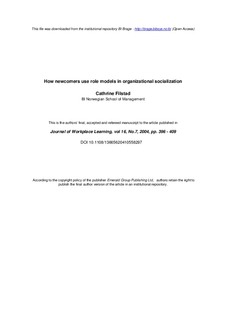How newcomers use role models in organizational socialization
Journal article, Peer reviewed
Permanent lenke
http://hdl.handle.net/11250/93500Utgivelsesdato
2004Metadata
Vis full innførselSamlinger
- Scientific articles [2181]
Originalversjon
Journal of Workplace Learning, vol 16, No.7, 2004, pp. 396 - 409 http://dx.doi.org/10.1108/13665620410558297Sammendrag
This study examines how newcomers use colleagues as role models in organizational socialization, taking a multiple level approach to organizational socialization as individual, social and cultural learning processes. The newcomers' most important personal characteristics are expectations, experience, self-confidence and competitive instinct. These personal characteristics were affected by early experience during the first four to six weeks in their new job. The study shows not only the correlation between early experience and personal characteristics, but also reveals a strong correlation between early experience and organizational socialization outcome. Newcomers rely on role models, and as a result of interaction and observation they acquire different qualifications from several role models. The term “multiple contingent role models” is introduced to explain how newcomers use role models.
Beskrivelse
This is the author's final and acceptet version, post refereeing, of the article. Publisher's version is available at www.emeraldinsight.com
